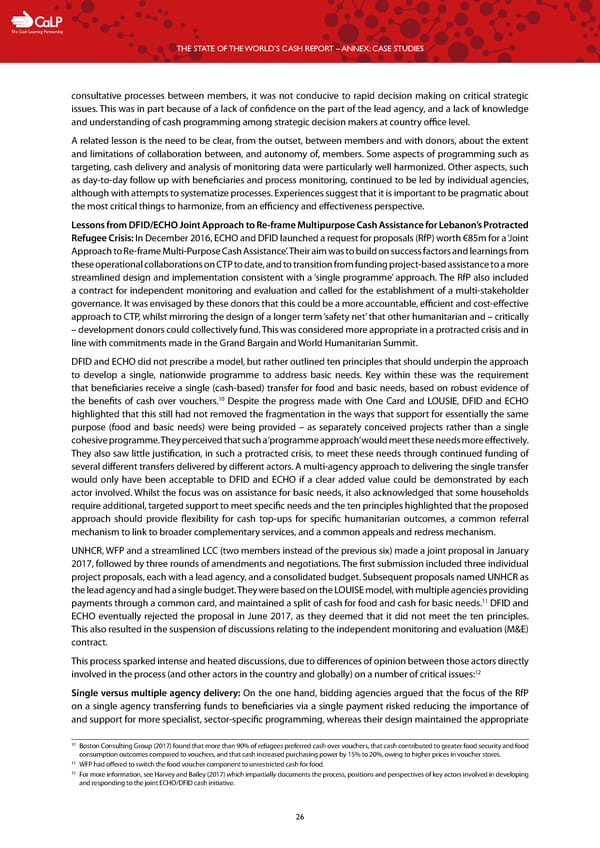C The Cash Learning Partnership THE STATE OF THE WORLD’S CASH REPORT – ANNEX: CASE STUDIES consultative processes between members, it was not conducive to rapid decision making on critical strategic issues. This was in part because of a lack of confidence on the part of the lead agency, and a lack of knowledge and understanding of cash programming among strategic decision makers at country office level. A related lesson is the need to be clear, from the outset, between members and with donors, about the extent and limitations of collaboration between, and autonomy of, members. Some aspects of programming such as targeting, cash delivery and analysis of monitoring data were particularly well harmonized. Other aspects, such as day-to-day follow up with beneficiaries and process monitoring, continued to be led by individual agencies, although with attempts to systematize processes. Experiences suggest that it is important to be pragmatic about the most critical things to harmonize, from an efficiency and effectiveness perspective. Lessons from DFID/ECHO Joint Approach to Re-frame Multipurpose Cash Assistance for Lebanon’s Protracted Refugee Crisis: In December 2016, ECHO and DFID launched a request for proposals (RfP) worth €85m for a ‘Joint Approach to Re-frame Multi-Purpose Cash Assistance’. Their aim was to build on success factors and learnings from these operational collaborations on CTP to date, and to transition from funding project-based assistance to a more streamlined design and implementation consistent with a ‘single programme’ approach. The RfP also included a contract for independent monitoring and evaluation and called for the establishment of a multi-stakeholder governance. It was envisaged by these donors that this could be a more accountable, efficient and cost-effective approach to CTP, whilst mirroring the design of a longer term ‘safety net’ that other humanitarian and – critically – development donors could collectively fund. This was considered more appropriate in a protracted crisis and in line with commitments made in the Grand Bargain and World Humanitarian Summit. DFID and ECHO did not prescribe a model, but rather outlined ten principles that should underpin the approach to develop a single, nationwide programme to address basic needs. Key within these was the requirement that beneficiaries receive a single (cash-based) transfer for food and basic needs, based on robust evidence of 10 the benefits of cash over vouchers. Despite the progress made with One Card and LOUSIE, DFID and ECHO highlighted that this still had not removed the fragmentation in the ways that support for essentially the same purpose (food and basic needs) were being provided – as separately conceived projects rather than a single cohesive programme. They perceived that such a ‘programme approach’ would meet these needs more effectively. They also saw little justification, in such a protracted crisis, to meet these needs through continued funding of several different transfers delivered by different actors. A multi-agency approach to delivering the single transfer would only have been acceptable to DFID and ECHO if a clear added value could be demonstrated by each actor involved. Whilst the focus was on assistance for basic needs, it also acknowledged that some households require additional, targeted support to meet specific needs and the ten principles highlighted that the proposed approach should provide flexibility for cash top-ups for specific humanitarian outcomes, a common referral mechanism to link to broader complementary services, and a common appeals and redress mechanism. UNHCR, WFP and a streamlined LCC (two members instead of the previous six) made a joint proposal in January 2017, followed by three rounds of amendments and negotiations. The first submission included three individual project proposals, each with a lead agency, and a consolidated budget. Subsequent proposals named UNHCR as the lead agency and had a single budget. They were based on the LOUISE model, with multiple agencies providing 11 payments through a common card, and maintained a split of cash for food and cash for basic needs. DFID and ECHO eventually rejected the proposal in June 2017, as they deemed that it did not meet the ten principles. This also resulted in the suspension of discussions relating to the independent monitoring and evaluation (M&E) contract. This process sparked intense and heated discussions, due to differences of opinion between those actors directly 12 involved in the process (and other actors in the country and globally) on a number of critical issues: Single versus multiple agency delivery: On the one hand, bidding agencies argued that the focus of the RfP on a single agency transferring funds to beneficiaries via a single payment risked reducing the importance of and support for more specialist, sector-specific programming, whereas their design maintained the appropriate 10 Boston Consulting Group (2017) found that more than 90% of refugees preferred cash over vouchers, that cash contributed to greater food security and food consumption outcomes compared to vouchers, and that cash increased purchasing power by 15% to 20%, owing to higher prices in voucher stores. 11 WFP had offered to switch the food voucher component to unrestricted cash for food. 12 For more information, see Harvey and Bailey (2017) which impartially documents the process, positions and perspectives of key actors involved in developing and responding to the joint ECHO/DFID cash initiative. 26
 The State of the World's Cash | Case Studies Page 27 Page 29
The State of the World's Cash | Case Studies Page 27 Page 29